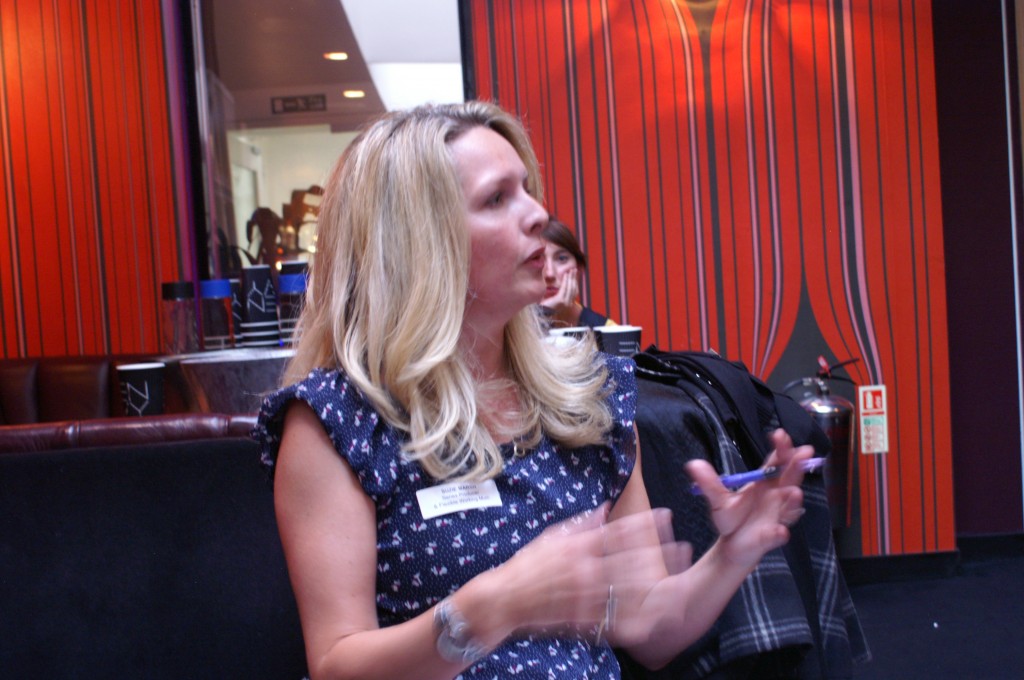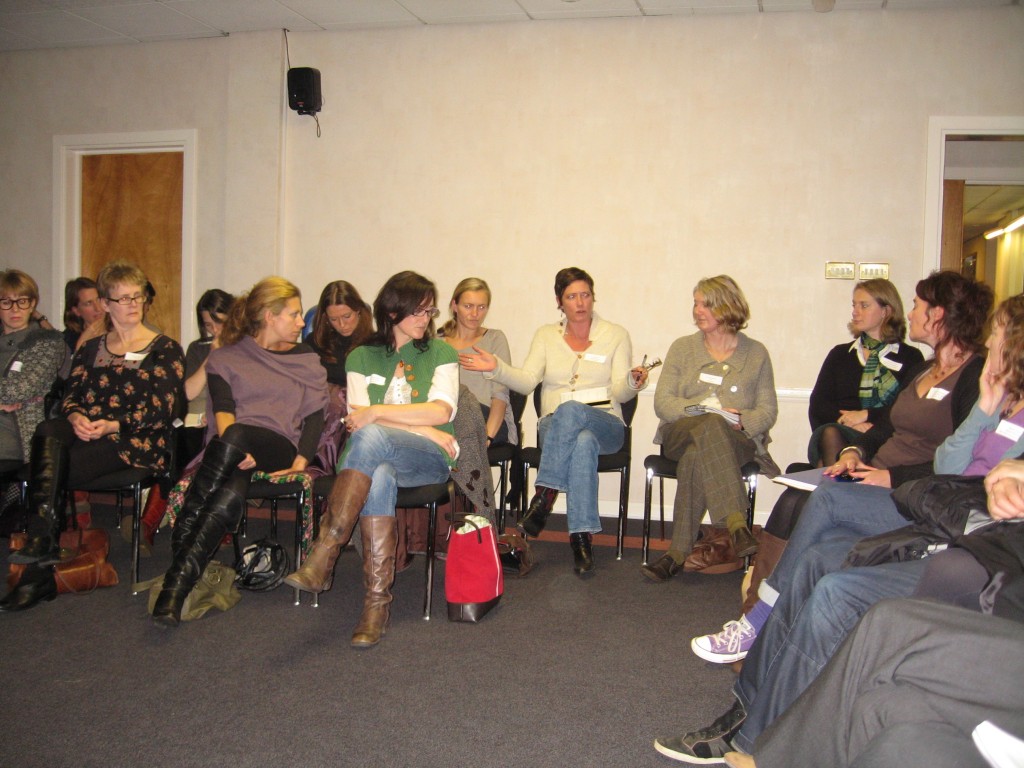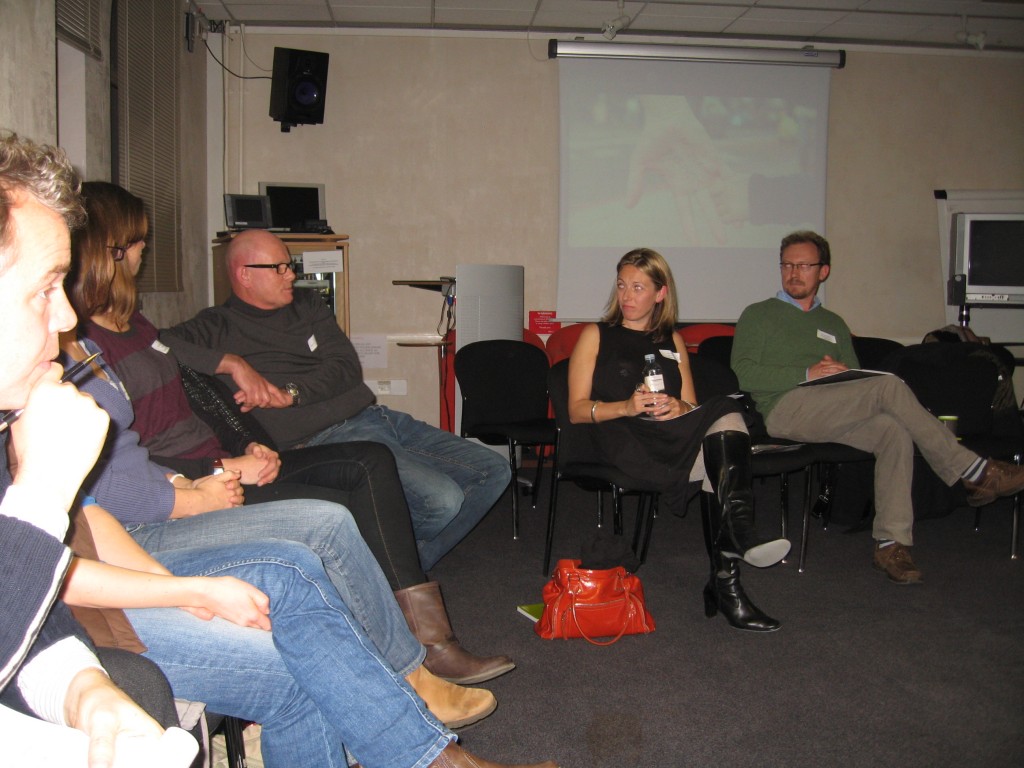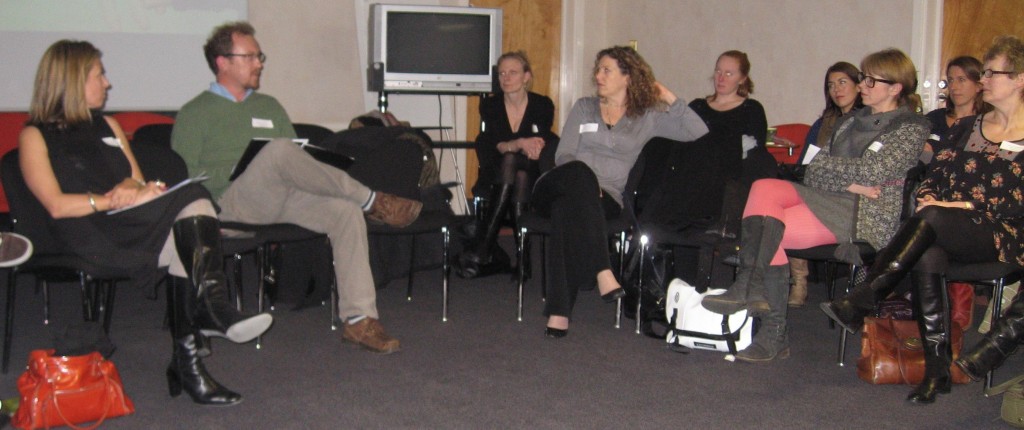Media Parents Series Producer Suzie Marsh discovers How to Network Effectively

http://www.mediaparents.co.uk is running a series of Christmas Parties and networking events in early 2011 to help you make connections, so here are some pointers on effective networking.
One of the hardest things to do as a freelancer is keep up your contacts, harder still is finding new ones. And it’s a million times harder to find the confidence if you’ve been out of the game having babies. Media Parents is here to help with that. Doesn’t matter how long it’s been though, taking off the baby head and putting on the work head again can feel a bit uncomfortable, and almost like it doesn’t quite fit the same either. Or, if you’ve been out of work for longer than planned (or wanted!) your confidence can take a large knock too.
I went along to a networking event on behalf of Media Parents set up by ‘Third Door’ in Putney. It’s run by parents Shazia Mirzia and Yusuf who were looking for a better way to balance work and childcare. Their idea brought the two together. A nursery downstairs, and rentable office space upstairs for parents who want to work flexibly. They also put together events to help people returning to work, those who are starting a new venture or just giving people the chance to meet new people – networking.
The event was not only ‘traditional’ networking (working the room whilst balancing a glass of wine and vol au vent in your hand), the evening started with a talk about the techniques and methods for making networking work for you. Anna Smee, a Business Consultant from Ovens & Smee, spoke to the group about ‘How to Network Effectively’.
She broke it down into three areas to consider:
1. Planning
2. Execution
3. Management
Planning
1. What/Who is your focus? To get a job, to broaden your contact base, to re-establish yourself and get yourself out and about again.
2. Who should you speak to? Think broadly to find people who can give you opinions, not just people who can hire you, but people who can give you background on a company/programme or information about the industry at the moment.
3. What is your objective at a networking event? Just to meet people and get out there, or make concrete connections?
4. Compare yourself against others, can you be different, how can you highlight your talents and stand out?
5. Timeline the three areas: planning, execution and management.
6. Manage your online presence
- Be more visible by making comments – write for the Media Parents blog and watercooler, write for journals, use comment to improve your personal brand
- Understand the sector, track your ‘brand’ development (google yourself; can you do anything to improve it, what you’re associated with etc. Or is there someone else with the same name as you?)
Execution
At the networking event
The most important thing is to prepare before you go – look at the list of attendees, do your research, find out about them and what programmes genres you have in common (if you’re coming to one of the Media Parents Christmas parties the names of some of the attendees are on the Media Parents watercooler – for a reason. It’s good to know who’s who. You can Google images of other people to give yourself a headstart.
Sharing information can lead to all kinds of leads, direct and indirect. The purpose of an event is about exchanging details and finding mutual contacts. But it shouldn’t be all about me, me, me! It’s about building bridges, making connections and sharing information about programmes and people. So, as much as you would like advice and help yourself, you should also be helping others with what you can offer. Maybe you’ve heard that a company is looking for researchers (you’re a producer, so not for you) pass on the info, it might be a stepping stone for someone else.
Don’t forget, you are interesting and other people will value your opinions. Something we don’t often consider is that other people feel nervous too, even Execs can be worried about meeting new people.
The worst bit of networking is if the person you’re speaking to seems distracted or disinterested. DON’T take it personally. Everyone has a lot of things on their mind all the time, it almost certainly isn’t you that is making them behave that way, but instead the fact that maybe their child is ill and they want to go home, or they’ve got a big presentation in the morning and want to get off and finish it. If you can see it’s happening, be resilient and professional, say your thank yous and move on.
What if you want to leave the conversation? Sometimes the talk can tend to wander and neither knows how to end it and move on. Honesty is the best policy. After you’ve exchanged details and talked about mutual interests, say, ‘It’s been lovely to meet you and I think I should go and try and meet a few other people tonight too’.
After the event
1. Always send thank yous to the organisers. Be courteous, and you’ll be invited again and remembered too.
2. With the new contacts you made; wait a few days before contacting; phone calls are better than emails. Always prepare what you’re going to say, have a little script ready. Stick with it and keep trying, perseverance will out!
Management
There are two areas to consider:
Data Management
It’s very important to keep track of business contacts and any relevant and mutual information. Then if you meet them again, you’ll remember you both are interested in; rugby, running or maybe you’ve worked on the same shows, and will appear (and actually be) super organised with a fantastic memory!
Relationship Management
Ask friends and family for help. Just chatting about opportunities, what you’re looking for in the future, they might just have something that can help. With your friends in the business, don’t expect or ask them for a job, but ask them to look out for you, maybe the name of the HR person at the company they’re at. But don’t put pressure on them to deliver. Those relationships are for the long term and should be nurtured.
Not all networking is about going to events where you’re expected to work the room. Think about the people in your life and those relationships that may be able to help you. There are three types of relationships, to consider.
1. Offers support – these people don’t work in the same business as you, but you can be honest with them, and they are with you. They may not help you find a job but they will help you stay motivated.
2. Refers/ Recommends – These people will usually work in the same business as you, and will email on your behalf to their contacts, forward your emails and put you in touch with others.
3. Consider you a candidate – These people want to employ you, but maybe haven’t got the right job for you at the moment. Make sure you keep in touch and let them know what you’re doing, every couple of months.
Think long term about your relationships. It’s not a harsh hard sell, as you’ll probably only work there once. And it’s not how often people will help you, but the fact that they’re willing to at all. Don’t forget it’s a two way street, you should enjoy what you can give, as much as what you hope to receive. What goes around comes around…

Suzie Marsh, flexible working Series Producer
ABOUT SUZIE MARSH :
I’m predominantly a studio producer, having spent fifteen years doing live programming including many many ‘This Mornings’!
After having children I branched out in Edit Producing (BBC Ent), and P/Ding, including running VT departments, as well as development. I’ve also SP’d youth discussion and magazine shows, as well as compilations shows. I chose to take on a variety of short term contracts to maintain a reasonable work/family life balance.
I’m looking to progress my career again now they’re both at school (and super keen to go to Disney World).
Suzie Marsh’s full biog and CV can be found at http://www.mediaparents.co.uk Details of the Media Parents Christmas parties where you can network to your heart’s content can be found elsewhere on this blog or by emailing admin@mediaparents.co.uk






















































